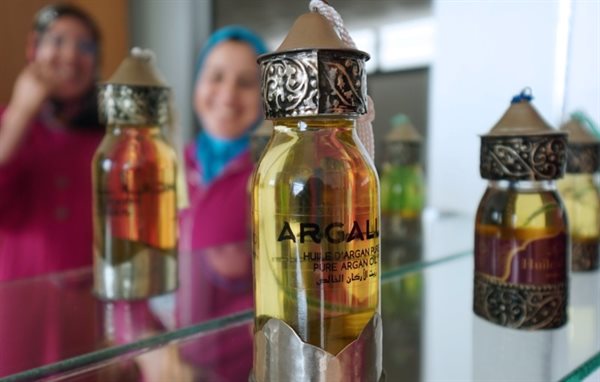Meet the Moroccan women making argan oil for the beauty industry

Most argan oil is produced by local cooperatives of Amazigh-speaking Berber women around the cities of Agadir, Essaouira and Taroudant where the argan tree, which bears small green fruit resembling an olive, is common.
For centuries the oil, among the most expensive in the world, has been extracted by drying argan fruit in the sun, peeling and mashing the fruit then crushing and grinding the kernel with stones. The oil was traditionally used as a flavouring and a savoury dip for bread. As an ingredient it is still common in Morocco and now also exported for food.
Surge in demand
Its use as a beauty product has created a surge in demand for the oil by international cosmetics companies, however. It also means that local groups are investing in more appealing packaging. The oil now costs around $30-50 a litre locally, but can sell on the international market in smaller high-end bottles for up to $250 a litre.
In the Tiout oasis near Taroudant (600km south of Rabat), the Taitmatine cooperative employs 100 women to produce argan oil, offering them a salary, free childcare, health insurance and literacy courses. The cooperative, whose name in Amazigh means "sisters", was set up in 2002.
Although new machines they use to help process the fruit have helped speed up the work, the women still have to remove the hard shell of the kernels by hand by pounding it with a stone, before the inner kernel can be pressed by a machine to extract the oil.
"It takes up to three days of grinding for every woman to get one litre of Argan oil," said Mina Ait Taleb, head of the Taitmatin cooperative.
"We work here but we also have fun and sing together," said Zahra Haqqi speaking in a room where dozens of women were grinding outer argan kernels using stones. Haqi said the job had helped her earn a regular income.
Source: Reuters

Reuters, the news and media division of Thomson Reuters, is the world's largest multimedia news provider, reaching billions of people worldwide every day.
Go to: https://www.reuters.com/About Ahmed Eljechtimi and Abdelhak Belhaki
Reporting by Ahmed Eljechtimi and Abdelhak Belhaki, Editing by Angus McDowall and Alexandra HudsonRelated
Morocco banks on green hydrogen to reach energy goals 7 Mar 2025 Morocco bans German feed grain imports amid FMD outbreak 31 Jan 2025 Morocco's airport capacity set to more than double by 2030 17 Dec 2024 Italy and African Development Bank sign $420m co-financing deal 5 Dec 2024 Morocco preparing law to allow cryptocurrencies, central bank chief says 26 Nov 2024 The price of South African influence 25 Nov 2024
























